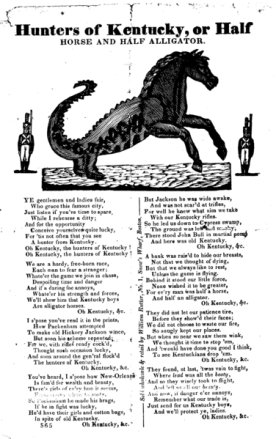This immensely popular song, filled with exaggerated memories of “Old Hickory” and his Kentucky riflemen overwhelming the well-trained and battle-tested army of Great Britain, became an effective part of Andrew Jackson’s successful campaign for president.
“We are a hardy, free-born race.” Verse from the popular ballad “Hunters of Kentucky; or the Battle of New Orleans

Library of Congress.
The popular song “Hunters of Kentucky” celebrates the role of the Kentucky riflemen in the American victory over the British at New Orleans in 1814. It became popular as a campaign song for Andrew Jackson after the War of 1812, but—like many instances of popular and political mythmaking—exaggerates certain details while obscuring others completely.
The song’s lyrics create the impression that militia riflemen, particularly those from Kentucky, won the Battle of New Orleans nearly singlehandedly. In reality, it was the U.S. Army’s artillery—a force of regular, professional soldiers—that was most responsible for the brutal carnage that resulted in the loss of 2,000 British troops. Furthermore, a lyrical reference to “beauty and booty” implies that the British planned to plunder New Orleans and rape the women, though there is no evidence to support those claims.
The song rearranges other details, as well. Jackson himself hailed from Tennessee, but “Hunters of Kentucky” proved a highly successful campaign song for his 1828 presidential run. (Though the ballad’s myths proved politically useful for Jackson and his Democratic Party, “Old Hickory” remained a critic of the Kentucky riflemen to the end of the days. Jackson chided the riflemen for their lack of preparedness and supplies when he called upon them to reinforce his defenses during the battle.)
Despite its inaccuracies and exaggerations, “The Hunters of Kentucky” had a long shelf life after the war. Its lyrics had special appeal to Americans who embraced the notion that citizen-soldiers like “Old Hickory” and sharpshooting Kentucky riflemen were superior in every way to professional soldiers, a hated symbol of both Britain and the “repressive” U.S. federal government. A song celebrating the uncompromised frontier virtues of a “hardy free-born race” found a ready audience in the decades following the war.
Last updated: November 20, 2018
